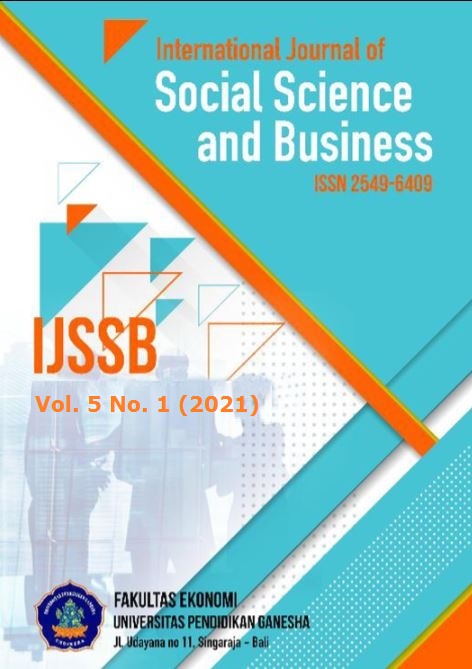Communication Challenges for Foreign Workers within Multicultural Hospitality Working Environment: Case Front Office of Hotel X in Japan
DOI:
https://doi.org/10.23887/ijssb.v5i1.32295Keywords:
Hospitality Industry, Multicultural, Working Environment, Communications ChallengesAbstract
As tourism grows fast and tourism destinations develops well all around the world, the human capital in the sectors are the most important component of its business which deliver services. The grow affects all aspects of business including hospitality industry. A multicultural working environment in hospitality industry has been practiced since decades due to its international character of business. The condition brought communication challenges to the internal operations more particularly in the front-line departments. This study aims to find out the challenges for foreign workers in the process of communication and how they overcome any communication problems that may occurred in their day-to-day operations in a multicultural hospitality working environment. Different cultures may press the communication problems while the business is about serving people and ensure that all the guest needs are provided well in timely manner. The research is conducted in a three-star-rated hotel in Japan with a multicultural environment and may give insights to the hoteliers who aspire to embrace their future career abroad. The findings are quite interesting since culture is taking the most important part to overcome and handle the situation as it aims to maintain a good working environment.
References
Afsar, B., Al-Ghazali, B. M., Cheema, S., & Javed, F. (2020). Cultural intelligence and innovative work behavior: the role of work engagement and interpersonal trust. European Journal of Innovation Management. https://doi.org/10.1108/EJIM-01-2020-0008.
Brett, J. (2018). Intercultural challenges in managing workplace conflict - A call for research. Cross Cultural and Strategic Management, 25(1), 32–52. https://doi.org/10.1108/CCSM-11-2016-0190.
Butow, P., & Hoque, E. (2020). Using artificial intelligence to analyse and teach communication in healthcare. Breast, 50, 49–55. https://doi.org/10.1016/j.breast.2020.01.008.
Carter, N., Bryant-Lukosius, D., Dicenso, A., Blythe, J., & Neville, A. J. (2014). The use of triangulation in qualitative research. Oncology Nursing Forum, 41(5), 545–547. https://doi.org/10.1188/14.ONF.545-547.
Daniel, E. (2016). The Usefulness of Qualitative and Quantitative Approaches and Methods in Researching Problem-Solving Ability in Science Education Curriculum. Journal of Education and Practice, 7(15), 91–100. https://doi.org/2222-288X.
Goh, E., & Lee, C. (2018). A workforce to be reckoned with: The emerging pivotal Generation Z hospitality workforce. International Journal of Hospitality Management, 73(January), 20–28. https://doi.org/10.1016/j.ijhm.2018.01.016.
Kadam, R., Rao, S. A., Kareem Abdul, W., & Jabeen, S. S. (2020). Diversity climate perceptions and its impact on multicultural team innovation and performance. Measuring Business Excellence, 24(3), 301–318. https://doi.org/10.1108/MBE-04-2019-0037.
Miller, K. (2012). Organizational Communication, Approaches and Processes (Sixth). Wadsworth, Cengage Learning.
Morrow, P. R., & Yamanouchi, K. (2020). Online apologies to hotel guests in English and Japanese. Discourse, Context and Media, 34, 100379. https://doi.org/10.1016/j.dcm.2020.100379.
Mucharreira, P. R., Antunes, M. G., Abranja, N., Justino, M. R. T., & Quirós, J. T. (2019). The relevance of tourism in financial sustainability of hotels. European Research on Management and Business Economics, 25(3), 165–174. https://doi.org/10.1016/j.iedeen.2019.07.002.
Neuman, W. L. (2014). Social Research Methods: Qualitative and Quantitative Approaches. In Pearson Education Limited (Pearson Ne). Pearson.
Oriade, A., Osinaike, A., Aduhene, K., & Wang, Y. (2021). Sustainability awareness, management practices and organisational culture in hotels: Evidence from developing countries. International Journal of Hospitality Management, 92(September 2020), 102699. https://doi.org/10.1016/j.ijhm.2020.102699.
Reddy, G., & van Dam, R. M. (2020). Food, culture, and identity in multicultural societies: Insights from Singapore. Appetite, 149(February), 104633. https://doi.org/10.1016/j.appet.2020.104633.
Shin, H., Perdue, R. R., & Kang, J. (2019). Front desk technology innovation in hotels: A managerial perspective. Tourism Management, 74(April), 310–318. https://doi.org/10.1016/j.tourman.2019.04.004.
Srinivas Rao, P. (2019). The Role of English as a Global Language. Reserach Journal of English (RJOE), 4(January), 65–79.
Sun, S., Lee, P. C., Law, R., & Zhong, L. (2020). The impact of cultural values on the acceptance of hotel technology adoption from the perspective of hotel employees. Journal of Hospitality and Tourism Management, 44(September 2019), 61–69. https://doi.org/10.1016/j.jhtm.2020.04.012.
Tsai, C. H., Linliu, S. C., Chang, R. C. Y., & Mak, A. H. N. (2020). Disaster prevention management in the hotel industry: Hotel disaster prevention literacy. Journal of Hospitality and Tourism Management, 45(September), 444–455. https://doi.org/10.1016/j.jhtm.2020.09.008.
Vom Lehn, D. (2014). Harold Garfinkel : the creation and development of ethnomethodology. Routledge New York.
Walker, J. R., & Walker, J. T. (2017). Introduction to Hospitality Management (4th ed.). Pearson Education Limited.
Wang, X., Guchait, P., & Pasamehmetoglu, A. (2020). Anxiety and gratitude toward the organization: Relationships with error management culture and service recovery performance. International Journal of Hospitality Management, 89(April), 102592. https://doi.org/10.1016/j.ijhm.2020.102592.
Yilmaz, M., Yildirim Sari, H., & Daghan, Ş. (2020). An exploratory study of intercultural effectiveness scale in nursing students. Heliyon, 6(2). https://doi.org/10.1016/j.heliyon.2019.e02769.
Zhao, H., & Zhou, Q. (2020). Socially responsible human resource management and hotel employee organizational citizenship behavior for the environment: A social cognitive perspective. International Journal of Hospitality Management, xxxx, 102749. https://doi.org/10.1016/j.ijhm.2020.102749.











